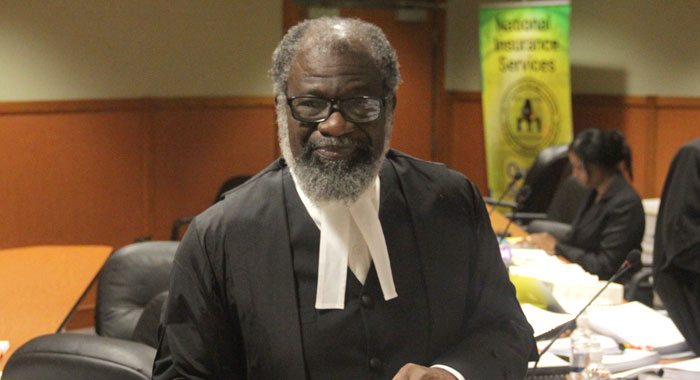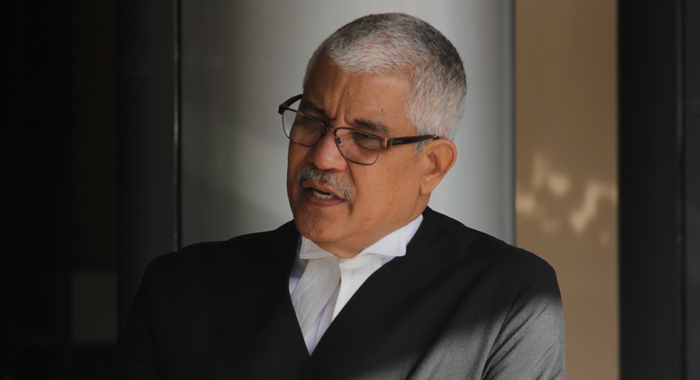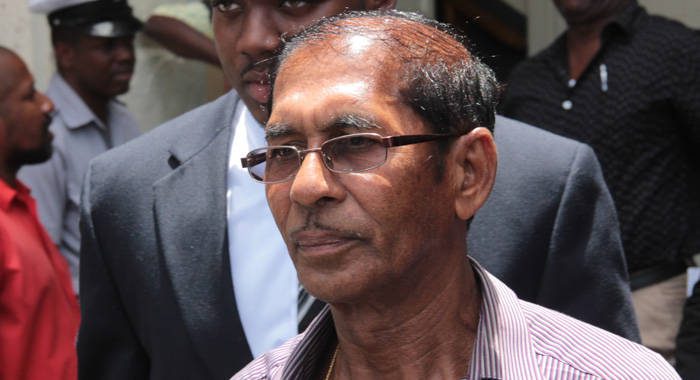Winston Gaymes, the returning officer for Central Leeward in the 2015 general election, who was not called to testify in the case challenging the results, has been described as “a ghost that haunts these proceedings”.
In his closing submission on Wednesday, Queen’s Counsel Stanley Stalky John, who represents the petitioner, Benjamin “Ben” Exeter, told the court:
“There is a ghost that haunts these proceedings and the critical aspect of these proceedings as we go through them. A ghost that should have been front and centre in the form of the first respondent but who has not seen it fit to show the defence to the court by putting up a defence of any sort in these matters.
“The final count was conducted by the petitioner, his agents, the first respondents and other parties. The only parties who have testified and in relation to whose testimony there is admissible evidence before this court are the petitioners and representatives.”
John was making the point that the respondents have offered no evidence in the face of the pleadings by the petitioner that the secrecy of the ballot was breached.
He said the two witnesses, Kathleen Jeffers and Wallace Christopher, who were presiding officers in Central Leeward and testified during the trial, did not address this issue in their witness statements.
“The respondents chose not to have anything to say, because as far as
the respondents are concerned, my lord, that evidence is not evidence,” he
said, referring to the evidence of Exeter and Maia Eustace, who was a roving
agent for him on polling day.

The judge asked if this was a perception that the secrecy of the ballots was violated.
John told the court this was more than a perception.
“There is the photograph of the ballots themselves. They did not contradict those and say those photographs do not reflect the ballots that were counted on that day. No presiding officer, m’lud, bothered to either tender a witness statement or attend the trial to give oral testimony to clarify for the court that, in fact, this was not the case.”
He said that what was more is that in the process of cross examination, “none of the witnesses were challenged in relation to whether or not the perception they had, the concrete depictions of the ballots themselves, what they said they saw, as supported by those depictions, was in fact not the case”.
John said that from concrete facts — the photos of the ballots that are depicted — the court is entitled to draw inferences.
He said there is no challenge to this evidence.
“As long as it is evidence and it’s evidence of material facts that are issues, your lordship must accept it, unless the other side had indeed, challenged it,” the lawyer told the court.
“So, together with hard concrete photographs, your lordship’s hands are tied, with respect, my lord, unless your lordship agrees with the other side that what is before your lordship is not evidence.
“But once it passes muster of evidence, your lordship will see that, by virtue of the fact, that the respondent, the principal party in this matter, who was responsible for the conduct of the election in Central Leeward, the first respondent, Mr. Gaymes, has not shown up. There was a witness summary that was filed in these proceedings, purportedly signalling the evidence that he would give.”
He said that the petitioner has addressed those issues and “the legal consequences of him not responding to the evidence, the legal consequences of no presiding officer, not a single one, had anything to say about that evidence, that your lordship’s hands are tied.
“Your lordship cannot be dismissive in much the same way that Mr. Gaymes or the presiding officers have been dismissive of your lordship’s court in relation to evidence that is brought before you. The Evidence Acts says clearly how that should be treated.”
The judge asked counsel John how should the court treat Gaymes’ witness summary.
The lawyer responded: “You lordship can only draw adverse inferences from that…”
However, in his closing submission on the same day, Senior Counsel
Douglas Mendes, lead lawyer for the respondents, said that for an election
petition there is no requirement for a respondent to put up a defence.

He said that the witness summary that Gaymes gave was not part of the court proceedings.
“The point is that the evidence that is contained in that document is not before you. No one swore to it and we have not referred to it at all,” Mendes told the court.
He said that the only thing the court can refer to in relation to Gaymes is an affidavit that Exeter exhibited to his witness statement.
“I thought that it would not play any part, but my learned friend, Mr. John, has referred to parts of it in his submission and is relying on it. My point is that it is not before you.”
Regarding the question of how to treat alleged unanswered evidence, Mendes cited a recent case in Dominica, where the election of Prime Minister Roosevelt Skerrit was challenged on the ground that he allegedly has a French passport.
Mendes said that the prime minister never went on record as saying he did not have a French passport, nor did he turn up to give evidence in the trial.
The lawyer said that there must be evidence for the respondents to respond to.
“And essentially, the conclusion that the court came to was that if you don’t have evidence in the first place, of the existence of the passport in that case, then the failure to respond, the failure to go on affidavit, the failure to deny, the failure to put in a defence, all of that amounts to nothing, if, in the first instance, you do not have any sufficient evidence, from which the court to draw an inference that the passport exists.
“So, just saying, by itself, Mr. Gaymes did not turn up, just saying by itself the presiding officers did not turn up, does not prove anything if you yourself have not put into evidence something which established, even on a prima facie basis, the existence of the thing,” Mendes told the court.
“For election petitions, there is no requirement to put in a defence… A formal defence that is, a document that you call defence… And you cannot get judgement based on an undefended claim. You have to come to court and you have to prove your case.”
A judgement in the case is slated to come on March 21.







Mendes is quite correct. Gaymes has no need, legal or otherwise, to defend hypothetical allegations or to prove that he did not “steal” the election.
The proof for any allegation rests entirely with the person making that allegation. It is illogical to expect accused persons to “prove” a negative, in this case that the elections were not stolen. It rests entirely with the accusers to prove that they were stolen.
C-Ben, we finally agree.
HE WHO ALLEGES MUST PROVE!!!